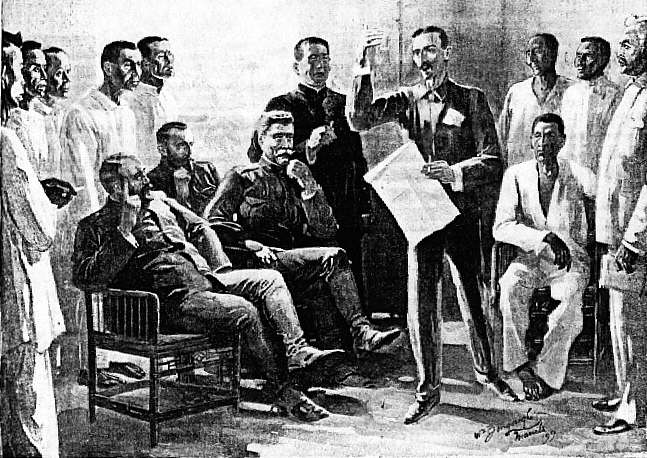(An article on General Lawton, our “Uncle Henry,” in the Philippines
Spanish American War)
Home Rule in Luzon
Below: Municipal Home Rule for the Filipinos
Organizing the local government at Las Piñas

Brig. Gen. Grant, USV, Hon. D. C. Worcester, Maj. Gen Lawton, USV, Interpreter, Wm Bengough
Philippines Commissioner Manila 1899
From Harpers Weekly, by William Bengough
Manila. August 1, 1899.
General Lawton as been dividing his time for the last few months between fighting and chasing Filipino insurgents, and in the intervals of war gently teaching Filipino non-combatants that the United States really means to give them their freedom.
This effort to convince the frightened natives that the Americans have not come to devour them meets at first with suspicion and hesitation. They cannot quite understand that peculiar combination — Americano. They are surprised to find that the terrible, bearded, recking fighters, who drive everything before them, eating Mauser fire apparently, when finished with their day’s work of carnage stop to play with the native babies, and actually pay good money for the fruit and eggs they need — money worth often ten times what the startled native has ever received for such commodities before. Thus, when General Lawton calls together the leading citizens of a town, after he has fought through it probably with terrifying results, the leading citizens assemble because they have no choice, and with troubled minds they listen to the American doctrines of fraternity, equality and liberty.
When, after a great amount of energetic eloquence from the interpreter (who a short while ago was an insurgent himself), they begin to grasp at the idea, they are shown how to elect their president and his advisors, and these proud personages are then thoroughly schooled in the proclamation issued by the Peace Commission presided over by Mr. Schurman. They are told to get to work and to put their town in order, to levy and collect their own taxes, and to spend the money for their own public works. Schools are opened, and most important of all, classes are begun in English, and so with no formality the new life of the Filipinos begins.
The illustration shows the beginning of home rule in Las Piñas. This little town only six miles from Manila, on the south shore of the bay, from which the rebels have only recently been driven out.
General Grant’s brigade is stationed along through the towns adjoining Las Piñas, and he was an interested attendant on the day when General Lawton arrived with Mr. Dean C. Worcester, who represents the commission at these gatherings. The local Filipino priest acted as host, and the meeting was held in the old church building.
The President and his advisors were elderly Filipinos, hard handed fishermen and mechanics, their earnest furrowed faces intent on the business in hand; and although in their simple native dress, shirt hanging in Chinese fashion, and with bare feet, they felt the dignity of their new position, and proudly sat to be sketched, and then proved their schooling by signing the likenesses in queer crabbed Spanish letters.
Already the effect of the generous treatment is being seen. Instead of finding a deserted town after the insurgents are driven out, the non-combatants now stay and trust the Americans.
With Thanks to Jean Lawton Reagan for finding and sharing this article